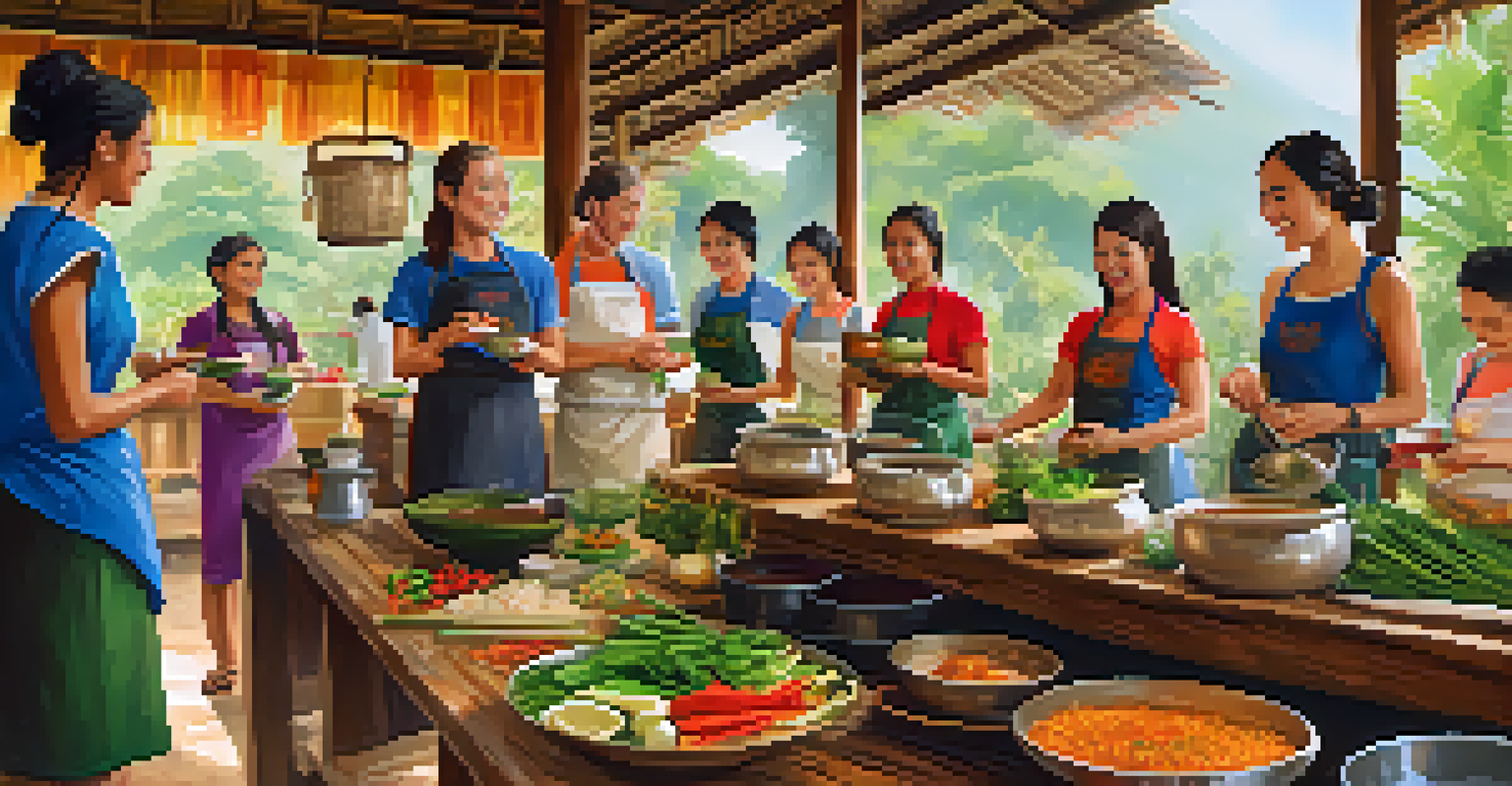Exploring Volunteer Tourism: Making a Difference in Thailand

What is Volunteer Tourism and Why It Matters
Volunteer tourism, often called 'voluntourism,' combines travel with community service. It allows travelers to immerse themselves in local cultures while contributing to meaningful projects. This unique approach not only enriches the traveler’s experience but also benefits the communities they engage with.
The best way to find yourself is to lose yourself in the service of others.
In Thailand, volunteer tourism has gained popularity as visitors seek ways to give back while exploring the breathtaking landscapes and vibrant culture. Programs often focus on education, wildlife conservation, and community development, making it an impactful way to travel. Essentially, it's about making a positive difference while enjoying the beauty of Thailand.
By participating in these initiatives, travelers gain a deeper understanding of the issues facing local communities. This connection fosters a sense of responsibility, motivating volunteers to become advocates for sustainable practices even after returning home.
Popular Volunteer Opportunities in Thailand
Thailand offers a diverse range of volunteer opportunities, catering to various interests and skills. From teaching English in rural schools to participating in marine conservation projects, there’s something for everyone. These programs often provide hands-on experiences that are as enriching for volunteers as they are beneficial for the local communities.

One popular avenue is working with elephants at sanctuaries, where volunteers help care for these majestic creatures while learning about their conservation. Participants can engage in daily feeding, bathing, and enrichment activities, fostering a deep connection with both the animals and the local culture.
Volunteer Tourism Enhances Travel
Combining travel with community service, voluntourism allows travelers to immerse themselves in local cultures while making a meaningful impact.
Another impactful option involves community development projects, such as building infrastructure or providing health education. These initiatives not only address immediate needs but also empower communities by building skills and fostering long-term sustainability.
Cultural Immersion: A Key Component of Voluntourism
Cultural immersion is one of the most rewarding aspects of volunteer tourism in Thailand. By living and working alongside locals, volunteers gain insights into the daily lives, traditions, and challenges faced by communities. This firsthand experience fosters mutual respect and understanding, enriching the travel experience.
Traveling – it leaves you speechless, then turns you into a storyteller.
Volunteers often engage in local festivals or cooking classes, allowing them to participate in cultural practices while building friendships. These interactions help break down barriers and create bonds that transcend geographical differences. Stories shared over a meal or during a community event can leave lasting impressions.
This deep connection to the culture enhances the overall experience, making it more than just a vacation. Volunteers return home with memories and friendships that last a lifetime, often inspiring them to continue advocating for the communities they visited.
The Impact of Volunteer Tourism on Local Communities
The impact of volunteer tourism can be profound, often addressing immediate needs in local communities. For instance, educational programs can provide children with access to resources they wouldn’t otherwise have, such as books and learning materials. This not only improves their education but also opens doors for future opportunities.
Moreover, environmental projects help combat issues like deforestation and pollution, leading to healthier ecosystems. Volunteers contribute to initiatives that restore natural habitats, enhancing biodiversity and promoting sustainable practices. This benefits not just the environment but also the livelihoods of local communities that rely on these resources.
Cultural Immersion Enriches Experience
Living and working alongside locals fosters mutual respect and understanding, leading to lasting friendships and a deeper appreciation of the culture.
Ultimately, the influence of volunteer tourism extends beyond the projects themselves. It fosters a spirit of cooperation and understanding, encouraging locals and visitors to work together towards common goals.
Challenges and Considerations in Volunteer Tourism
While volunteer tourism has many benefits, it also comes with challenges that participants should consider. One concern is the potential for 'voluntourism fatigue'—when projects become more about the experience for volunteers than the needs of the community. It’s crucial for programs to maintain a focus on genuine community benefit.
Additionally, volunteers must be aware of their impact on local economies and cultures. Engaging in activities without proper understanding can sometimes lead to unintended consequences, such as dependency or disruption in local practices. Therefore, it's essential to choose reputable organizations that prioritize ethical practices.
Preparation and research are vital for anyone considering volunteer tourism. Understanding the community's needs and how to contribute effectively can make a significant difference in the overall experience and outcome.
How to Choose a Responsible Volunteer Program
Choosing a responsible volunteer program is key to ensuring a positive experience for both the volunteer and the community. Start by researching organizations that have established partnerships with local communities to ensure that projects meet genuine needs. Look for reviews and testimonials from past volunteers to gauge the program's effectiveness and ethical practices.
It’s also wise to consider the program's transparency regarding costs and how funds are allocated. Understanding where your contributions go can help you feel confident that your efforts are making a real difference. Programs that prioritize community input and feedback are often more sustainable and effective.
Choose Responsible Programs Wisely
Selecting ethical volunteer programs that prioritize community needs ensures a positive experience for both volunteers and the communities they serve.
Lastly, consider your own skills and interests when selecting a program. Choosing a project that aligns with your strengths not only enhances your experience but also ensures that your contributions are valuable to the community.
The Future of Volunteer Tourism in Thailand
As awareness of sustainable travel grows, the future of volunteer tourism in Thailand looks promising. More travelers are seeking ways to make a positive impact, and organizations are adapting to meet this demand. This shift towards ethical voluntourism is encouraging the development of more sustainable programs that prioritize community needs.
Moreover, local communities are increasingly becoming active participants in shaping volunteer projects. By involving community members in decision-making, programs can ensure that their efforts are targeted and effective. This collaborative approach fosters a sense of ownership and empowerment among locals.

Ultimately, the evolution of volunteer tourism in Thailand reflects a broader trend towards responsible travel. As travelers become more conscious of their impact, they are likely to seek out experiences that not only enrich their lives but also leave a lasting, positive legacy in the communities they visit.